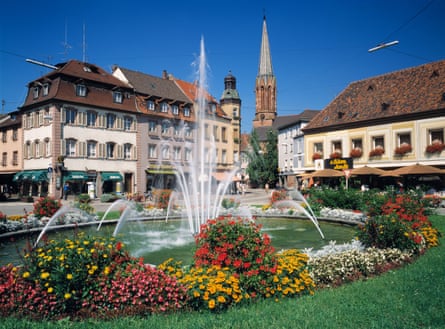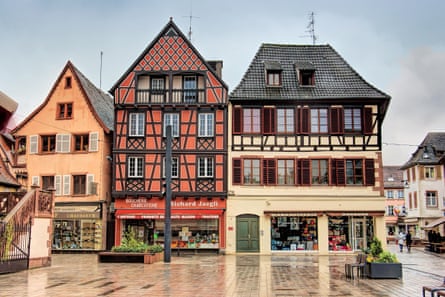Outside the bakery in Sélestat, a pleasant small town of cobbles, gables and two fine medieval churches in Alsace, eastern France, is a sign saying bread has been baked on this site since 1866 – except from 1942 to 1945, when it was “closed by the Germans”.
Barely 20 miles away, over the river in Emmendingen, a pleasant small town of cobbles, gables and a ruined 11th-century castle in western Germany, a sign at what remains of a medieval gate regrets that it was “destroyed by the French in 1689”.
Q&AWhat is the YouGov-Cambridge Globalism Project?
Show
The project is a new annual survey of global attitudes in 23 of the world's biggest countries, covering almost 5 billion people.
The 2019 survey canvassed 25,325 people online across much of Europe, the Americas, Africa and Asia in February and March.
Questions about populist attitudes and convictions were inserted in order to derive a "populist cohort", and discover what this group of people think about major world issues from immigration to vaccination, social media and globalisation.
The full methodology can be found here.
Nowadays the towns and villages either side of the Rhine, a historic battleground between Europe’s two major powers, display more similarities than differences. After seven decades of peace and determined Franco-German friendship, the border checkpoints between them have long gone.

One side, though, feels a lot less happy than the other. As findings from a global survey of opinions conducted by the YouGov-Cambridge Globalism Project reveals, compared with Germans, the French are far more pessimistic about their future and far more likely to say things will get worse for the country.
They are also significantly more critical than Germans of government and public services, and distrustful of the EU and globalisation.
At the market in Sélestat, there was a ready response. “We’re a nation of moaners,” said Jean-Philippe Cézard, 53, who lost his job as an IT specialist four years ago and now runs a cheese stall. “We want, as the saying goes, the butter, the money from the butter and a kiss from the dairymaid – and when we don’t get all three, we moan.”
It is, agreed Francois and his wife, Elisa, home visiting family from China where they now live, cultural and historical. Relatively speaking, said Francois, who asked not to give his second name, France “is a land of plenty. When you have so much, you want perfection. Americans say everything’s awesome. We say everything’s shit.”

French state provision – healthcare, and benefits – were “astounding compared to so many countries”, said Elisa. “People here really don’t realise how lucky they are. Yes, some genuinely find it hard to make ends meet, and they could be helped more. Yes, people are sick at the taxes they pay. But the system, basically, works.”
Yasmine Halabi, 41, a home visitor for the elderly with two children, said she had €38 in her bank account at the end of April and saw very clearly why some felt unhappy. “We are really squeezed,” she said. “A family can’t live on €1,200 a month. That’s what the gilets jaunes [yellow vests] protests are all about. I understand when they complain. I complain.”
On the other side of the river, Germans were slightly nonplussed. “I think maybe there’s more of a sense of … I don’t know, solidity in Germany,” Klaus Lehmann, 46, a hospital doctor, said cautiously on the square by Emmerdingen’s old town hall.
“In France, passions run a bit higher, don’t they? Everything seems just a bit more … volatile. They’re epicureans, they enjoy the little things in life a lot more than we do – but I guess they worry a lot more about the big things.”
Katja Pohl, a 20-year-old economics student, said that since its major labour market reforms of the early 2000s, Germany had been “on a roll. Unemployment down, output up. At the same time, other countries in Europe – though not particularly France – have suffered. People feel the country must be doing something right.”
Stephanie Sommer, 34, playing with her two-year-old daughter on the Castle Square swings, said some things in France always seemed better. “We often go to a French market when we want something special,” she said. “But it’s true they do like to complain. It’s almost like they take pleasure in being grumpy.”
French grouching extends to the country’s feelings about the EU, according to the survey – even if it has always been part of the powerful Franco-German tandem that has traditionally driven the bloc.
Perhaps the ultimate slight to the project is this: asked to choose who they would prefer to be the most powerful force in world politics, 42% of French people who completed the survey chose the Americans. Just a third of French respondents chose the EU, compared with 58% of Germans.
It is not just about a tendency to be be grumpy, though. Observers said the sharp contrast in mood, morale and outlook in Europe’s two leading powers probably has its roots in economics, politics and the way they are governed.
According to the OECD’s Better Life index, France trails Germany – significantly – in employment (65% of French working-age adults have a paid job, against 75% in Germany). Adjusted average disposable income is also slightly lower, at $31,140 against $33,650.
“If you look at their experience over the past 10 years, it’s actually quite surprising Germans aren’t even more positive,” said Almut Möller, head of the Berlin office of the European Council on Foreign Relations. “The economy’s done well, globalisation has broadly worked for us, we punch above our weight internationally.”
In addition, she said, “Germany has really been powerful in Europe, and is seen to be as powerful – that inspires a confidence in what your country can do for you. And of course, we have always valued the EU, because it has brought us back into the heart of European democracies.”

More recently, Germany has not witnessed terror attacks on its identity and way of life on the same scale as France, she said, nor seen the far right surge to the same degree, helping a feeling of stability. Its federal, consensus-driven political system may also ensure people feel they are better represented, she added.
The French, on the other hand, said Manuel Lafont Rapnouil, head of the thinktank’s Paris office, have long demonstrated “a deep dissatisfaction with the way their political institutions work: every election, it’s out with the incumbents. And they see the services that they feel are important for their way of life being steadily eroded.”

The French dislike globalisation “essentially because it’s used as a reason to tell them they must adapt. The same goes for Europe, with its budget and competition rules. The French economy really hasn’t done so badly; inequality’s not so disastrous. But the gilets jaunes have shown that even if the headline figures look OK, when you drill down, things actually aren’t.”
The French may take a perverse pride, Rapnouil conceded, in the fact that “we protest more, aren’t easily satisfied, are hard to govern, impossible to reform … But in fact there have been plenty of reforms, but they have often been short-sighted, piecemeal, badly managed.
“I think people see that France is not finding the right responses to the big, long-term challenges, and it makes them insecure about their future.”
All may change, of course. Fears have been mounting of late about the sustainability of Germany’s export-driven model, its huge trade surplus, demographic time-bomb, lack of investment and poor digital infrastructure.
Long-term changes in trade and technology could yet take the wind out of Germany’s sails, economists believe. “We could just,” said Möller, “be reaching a tipping point.” Gallic gloom may yet become Teutonic tristesse – though it would be a brave person who bets on it.
